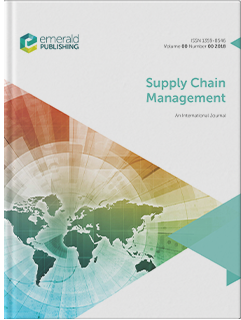评估在可持续食品供应链中使用工业5.0 (I5.0)无人机进行清洁生产的意图:新兴经济体背景
IF 8.4
3区 管理学
Q1 BUSINESS
Supply Chain Management: An International Journal
Pub Date : 2023-11-02
DOI:10.1108/scm-01-2023-0045
引用次数: 0
摘要
本研究的目的是评估食品供应链利益相关者在食品供应链中使用工业5.0 (I5.0)无人机进行清洁生产的意图。设计/方法/方法作者采用了定量研究设计,并通过对尼日利亚264个食品供应链利益相关者进行的在线调查收集数据。采用偏最小二乘结构方程模型对研究假设的关系进行评估。作者提供了实证证据来支持I5.0无人机对清洁生产的贡献。调查结果显示,食品供应链的利益相关者更关心在具体操作中使用I5.0无人机,比如减少植物病害,这总是能提高清洁生产。然而,如果目标是减少污染、预测季节性产出和解决工人的健康和安全挑战,那么采用无人机的倾向就会降低。研究结果概述了提高意识的必要性,以促进无人机的使用,以解决工人面临的危险挑战,并在新兴经济体中转移有关I5.0潜力的知识。据作者所知,这项研究是第一个使用可持续性模型解决I5.0无人机采用问题的研究。作者通过扩展可持续性模型,通过解决特定的系统操作来确定无人机使用在促进清洁生产方面的贡献,从而为现有文献做出贡献。本研究通过增加可持续性模型来解决这一差距,表明可持续性技术采用的动机是遏制被归类为驱动因素和中介因素的挑战。本文章由计算机程序翻译,如有差异,请以英文原文为准。
Evaluating the intention to use Industry 5.0 (I5.0) drones for cleaner production in Sustainable Food Supply Chains: an emerging economy context
Purpose The purpose of this study is to evaluate food supply chain stakeholders’ intention to use Industry 5.0 (I5.0) drones for cleaner production in food supply chains. Design/methodology/approach The authors used a quantitative research design and collected data using an online survey administered to a sample of 264 food supply chain stakeholders in Nigeria. The partial least square structural equation model was conducted to assess the research’s hypothesised relationships. Findings The authors provide empirical evidence to support the contributions of I5.0 drones for cleaner production. The findings showed that food supply chain stakeholders are more concerned with the use of I5.0 drones in specific operations, such as reducing plant diseases, which invariably enhances cleaner production. However, there is less inclination to drone adoption if the aim was pollution reduction, predicting seasonal output and addressing workers’ health and safety challenges. The findings outline the need for awareness to promote the use of drones for addressing workers’ hazard challenges and knowledge transfer on the potentials of I5.0 in emerging economies. Originality/value To the best of the authors’ knowledge, this study is the first to address I5.0 drones’ adoption using a sustainability model. The authors contribute to existing literature by extending the sustainability model to identify the contributions of drone use in promoting cleaner production through addressing specific system operations. This study addresses the gap by augmenting a sustainability model, suggesting that technology adoption for sustainability is motivated by curbing challenges categorised as drivers and mediators.
求助全文
通过发布文献求助,成功后即可免费获取论文全文。
去求助
来源期刊
CiteScore
16.70
自引率
5.70%
发文量
27
期刊介绍:
Supply Chain Management (SCM) is a journal that places great emphasis on research findings with international relevance and global impact, benefitting both theory and practice. To be considered for publication, research papers and case studies submitted to SCM must contribute to extending supply chain knowledge beyond a dyadic perspective.
The journal focuses specifically on empirical research and does not accept submissions related to modelling or simulation. This is because the challenges posed by globalization and rapidly evolving technology trends have a direct impact on supply chain design and management. Therefore, it is essential for contemporary supply chain practices to be responsive, proactive, integrated, and driven by information when managing the various components of the supply chain.

 求助内容:
求助内容: 应助结果提醒方式:
应助结果提醒方式:


